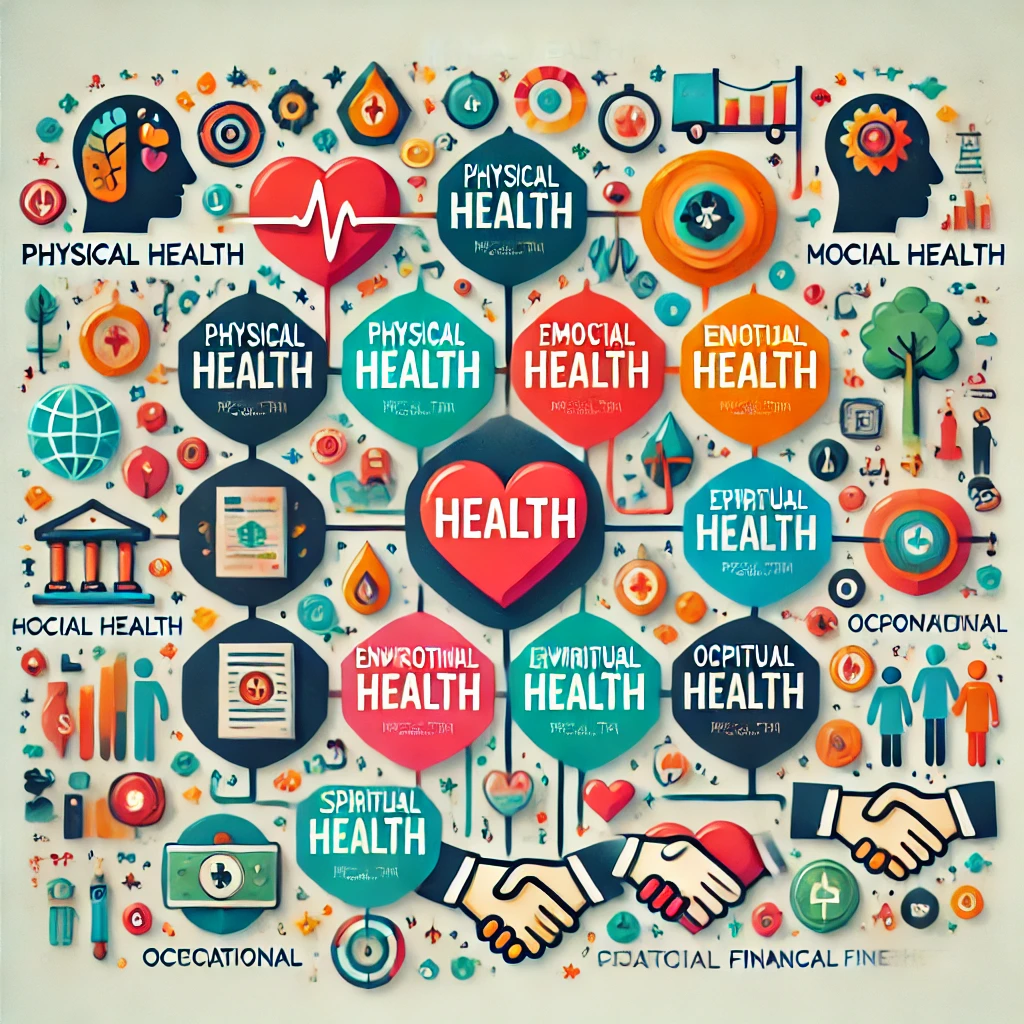Health is a multifaceted concept encompassing various aspects of well-being. Each category of health represents a crucial component of a balanced life, and maintaining each one is key to achieving overall health. Let’s explore the primary categories of health to understand their unique contributions to a holistic, healthy life.
1. Physical Health
Physical health is the most recognizable category, referring to the state of the body and its ability to perform daily tasks. Good physical health involves:
- Nutrition: Consuming a balanced diet that provides essential nutrients.
- Exercise: Engaging in regular physical activity to maintain cardiovascular, muscular, and skeletal health.
- Sleep: Restorative sleep allows the body to recover and maintain proper immune and cognitive functions.
- Preventive Care: Regular medical check-ups, vaccinations, and screenings help prevent disease and manage existing conditions.
Maintaining physical health is the foundation for overall well-being, as it influences all other categories of health.
2. Mental Health
Mental health refers to cognitive and emotional well-being. It includes our ability to think clearly, manage emotions, cope with stress, and build resilience. Key aspects of mental health include:
- Emotional Regulation: The capacity to understand and manage one’s emotions.
- Stress Management: Developing strategies to handle stress positively, such as mindfulness or relaxation techniques.
- Cognitive Health: Ensuring healthy brain function and mental clarity through activities that stimulate thinking and learning.
Mental health is foundational for decision-making, relationship-building, and overall quality of life. Good mental health enables individuals to face life’s challenges with resilience and adapt to change positively.
3. Social Health
Social health focuses on relationships and our ability to interact positively with others. Strong social connections contribute to mental well-being and offer a sense of belonging. Social health includes:
- Interpersonal Relationships: Building meaningful connections with family, friends, and community members.
- Communication Skills: Effectively expressing thoughts and feelings and understanding others.
- Social Support: Having a reliable support system for encouragement and companionship.
Maintaining social health promotes happiness and reduces feelings of loneliness or isolation, which can contribute to mental health struggles.
4. Emotional Health
While closely related to mental health, emotional health specifically refers to the capacity to express and manage emotions. Good emotional health allows individuals to experience a full range of emotions and to respond to situations appropriately. Key aspects include:
- Self-awareness: Recognizing one’s emotions and their effect on behavior.
- Empathy: Understanding and sharing the feelings of others.
- Resilience: Bouncing back from adversity and maintaining emotional stability.
Emotional health is essential for personal growth, self-compassion, and effective communication with others.
5. Environmental Health
Environmental health concerns the physical surroundings that impact our well-being. It includes the quality of air, water, and the presence of safe infrastructure. Key aspects include:
- Air and Water Quality: Clean air and water are essential for physical health.
- Living Conditions: Safe housing and access to clean environments contribute to a healthy lifestyle.
- Sustainable Practices: Engaging in eco-friendly practices that support long-term environmental health, such as recycling or conserving resources.
A healthy environment is vital for preventing health problems and ensuring access to natural resources for future generations.
6. Spiritual Health
Spiritual health involves a sense of purpose, meaning, and connection to something larger than oneself. It’s not solely religious but can also encompass personal beliefs and values. Key aspects include:
- Purpose and Meaning: Having a sense of purpose and direction in life.
- Connection: Feeling connected to a community, nature, or a higher power.
- Mindfulness and Reflection: Practicing mindfulness, meditation, or self-reflection to deepen self-awareness.
Spiritual health provides individuals with inner peace, reduces stress, and enhances life satisfaction.
7. Occupational Health
Occupational health concerns an individual’s satisfaction and well-being in their work or professional life. A fulfilling work environment promotes mental and social health. Key aspects include:
- Work-Life Balance: Balancing professional duties with personal life.
- Job Satisfaction: Finding meaning and purpose in one’s work.
- Safe Working Conditions: Ensuring the physical and mental well-being of employees by providing a healthy work environment.
Occupational health contributes to a sense of purpose, personal growth, and financial security, which are all essential to overall well-being.
8. Financial Health
Financial health is related to an individual’s financial stability and ability to manage economic resources responsibly. Key components include:
- Budgeting and Savings: Planning for expenses and saving for future needs.
- Debt Management: Managing and reducing debt for long-term financial security.
- Financial Goals: Setting and achieving financial milestones for future stability.
Good financial health reduces stress, allows for more life opportunities, and provides a foundation for a secure lifestyle.
Conclusion
The categories of health illustrate the complexity and interconnectedness of human well-being. Each category affects the others, forming a comprehensive health profile that requires balanced attention and care. Understanding and nurturing these dimensions leads to a holistic approach to well-being, allowing individuals to lead fulfilling, resilient, and healthy lives.



